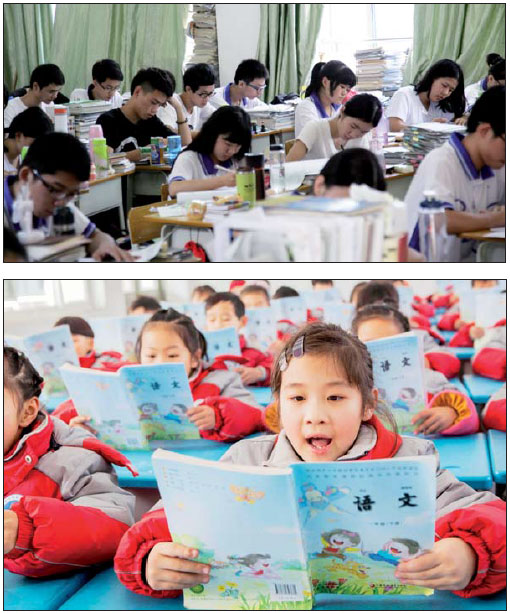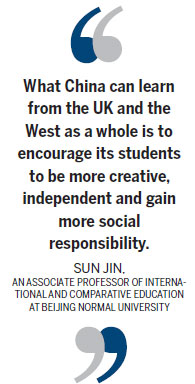School for thought
Updated: 2015-08-28 08:28
By Zhang Zhouxiang and Zhang Chunyan(China Daily Europe)
|
|||||||||||
|
Top: Students prepare for gaokao, the national college entrance exam, in Guangdong province. Above: Primary students at class in Lianyungang, Jiangsu province. Photos provided to China Daily |
"You can also get detention during or after school or may have to come in on a Saturday."
Besides comparing education systems in the two nations, more viewers, experts and teaching practitioners focused on the documentary itself, calling it a reality show and questioning the idea of reaching any conclusion from a simple one-month experiment.
The BBC took six months to select qualified Chinese teachers, Chinese media reported. The teachers had to have five years teaching experience in China covering English, mathematics, science or social sciences. They also had to be able to teach in English. And the five teachers were told by the BBC that they need to teach in a strict and very typical Chinese way.
But actually only Zou Hailian and Li Aiyun, two of the five, were recruited directly from the Chinese mainland, and the other three have lived in the UK for a long period. This led the audience to start asking: Are the teachers all using the current Chinese method?
Wang Xuming, a former spokesman for the Chinese Ministry of Education and now president of Language and Culture Press, says: "It (the BBC series) is an entertainment program, and the five teachers do not represent the majority of teachers in China.
"The five teachers are excellent in certain aspects, and their 'Chinese style', which includes penalties for disobedient students and harsh scolding for their faults, exists among some Chinese teachers, but definitely not all," he says, pointing out that some of details in the documentary, like the male teacher Zou scolding a student for "embarrassing the school", are no longer practiced by the majority of teachers in China.
He is echoed by Li Jun, associate professor of education policy at the University of Hong Kong, who says: "It must be noted that China is a huge country that does not lack diversity.
"The Chinese style in the documentary may be partly true in some cram schools for the key exam in China, the gaokao, the national college entrance exam, but not in most others," Li says. "No doubt that it (the program) is biased, incomplete and of course misleading."
Many Chinese netizens commented on China's Twitter-like platform, Sina Weibo, saying that although China's education is criticized for lacking independent and creative thinking, actually its basic education system is strong and has improved in recent years.
"The Chinese approach to education is not confined to absolute obedience, because teachers also encourage students' potential," says Zhang Qi, a 22-year-old student who has studied in China and Britain.
Some viewers rejected the premise that British schools should be labeled "without discipline", and didn't think the behavior of some of the students in the documentary was typical.
Iona Fleming, a British student, says in an online debate on the subject, that Bohunt students' behavior was not typical of British teenagers. "I would just like to say that not all British teenagers would behave this badly."
Some netizens point out that careful scrutiny revealed that all the students that acted disruptively in front of the cameras wore small microphones on their collars, while most others did not.
That aroused suspicion among viewers that the series might be more of an entertainment show instead of a serious documentary.
Jo Morgan, an experienced math teacher in the UK, says: "Education is not entertainment, and the editors were very manipulative."
For Christopher King, chairman of the Headmasters' Conference and principal of Leicester Grammar School, it was not a good idea to do the experiment without providing ample description or training in advance. In the UK, teachers and students usually exchange views in order to find the best way of education, he says in an interview with Chinese news websiteSina.com, adding that any teacher coming from overseas needs be given details about the system to make his or her teaching efficient.
King also says that Chinese teachers have a lot to teach UK students, but with the prerequisite that the two sides have ample communication and understand each other.
Dai Xiaowei, a Chinese producer who works for a TV station, says the BBC program uses a typical BBC style of narrative method. It pays attention to balance of the two sides, but what they want to compare is all shown and edited in this program.
The BBC's Bagnall says it was a formatted documentary in which they designed various scenarios, and the audience was aware of this. They then used documentary shots to record what happened. He says that the documentary is real and fully recorded.
Cameras were set up to capture the experiment and to "give a true representation of how the students reacted to the Chinese teaching style", the BBC adds in a statement.
Despite the various opinions and disputes on the program, some education experts note that the BBC documentary should be seen as an attempt to build a bridge between Eastern and Western-style education and an opportunity to start a broader discussion on different education systems. In particular, it should prompt people from both countries to ask what good education is all about, and what standards should be followed to determine the quality of education.
Today's Top News
Xi meets with former KMT chairman
Migrants protest as Hungary shutters Budapest train station
China manufacturing PMI falls to 49.7 in August
Migrant trains reach Germany as EU asylum system creaks
Second homes in China need lower down payment
Chinese athletes win 9 medals at Beijing world championships
Houston physicist invited to view V-Day parade in Beijing
Journalist, securities regulatory official held for stock market violation
Hot Topics
Lunar probe , China growth forecasts, Emission rules get tougher, China seen through 'colored lens', International board,
Editor's Picks

|

|

|

|

|

|








